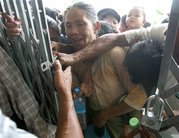
More than 1 million people still don’t have adequate food, water or shelter a month after a devastating cyclone swept through Myanmar, and the military junta’s policies are hindering relief efforts and driving up the cost of aid operations, the United Nations said Tuesday.
Humanitarian groups say they continue to face hurdles from Myanmar’s military government in sending disaster experts and vital equipment into the country. As a result, only a trickle of aid is reaching the storm’s estimated 2.4 million survivors, leaving many without even basic relief.
Compounding these problems, the junta’s refusal to allow the use of military helicopters from neighboring countries is driving up relief costs, an official from the World Food Program said.
Aid groups are unable to provide 1.1 million survivors with sufficient food and clean water, while trying to prevent a second wave of deaths from malnutrition and disease, the U.N. said in its latest assessment report.
Of the 1.3 million people who are getting help, most have been “reached with inconsistent levels of assistance,” the U.N. said.
“There remains a serious lack of sufficient and sustained humanitarian assistance for the affected populations,” the report said.
It also said the world body lacked “a clear understanding of the support being provided by the Government of Myanmar to its people.”
It’s shocking that cyclone victims still need basic relief after four weeks, said Sarah Ireland, regional director of the British aid organization Oxfam, which is trying to get permission to work in Myanmar.
“If we were in a normal response by week four, those affected should be working toward recovery,” she said Monday. “They would be in a position perhaps to think about what they need to restart their lives. But we know people on the ground don’t have food to eat.”
Tidal surges as high as 12 feet reached some 25 miles inland as the cyclone churned through the country for two days beginning May 2. The storm laid entire villages in the Irrawaddy delta to waste and left 78,000 people dead and another 56,000 missing, according to the government’s count.
But the relief has yet to match the scale of the disaster.
A big obstacle in providing relief has been reaching the delta. The U.N.’s World Food Program has chartered helicopters to deliver aid to the hard-hit area, said Paul Risley, a spokesman for the agency in Bangkok, after the government refused to allow military helicopters in.
Ordinarily, in large scale disasters – such as the 2004 Indian Ocean tsunami and Pakistan’s 2005 earthquake – military helicopters are used to meet the massive immediate emergency requirements, he said.
But the WFP is facing a 64 percent shortfall of its $70 million appeal to fund the operation, and Risley warned that expenses are skyrocketing, due in large part to the reliance on the chartered choppers and other logistical hurdles. He indicated that with two months left in the appeal, the agency would likely meet the target.
Myanmar was only able to supply seven helicopters to the WFP, and the organization chartered 10 privately owned choppers and ship them to Bangkok. The Canadian and Australian governments ferried some of the helicopters, but the WFP spent “roughly $1 million” to bring three from Uganda, Risley said.
Only one helicopter has arrived in Myanmar so far, heading to the Irrawaddy delta on Monday. The other nine are in Thailand and “ready to fly,” Risley said.
Thus far, most relief supplies have been transported along dirt roads and by boat. Vessels able to navigate the debris-filled canals are scarce and efforts to import trucks and other vehicles have been hampered by governmental red tape.
“For aid agencies it is very important that those affected receive a full complement of appropriate aid,” said James East, a spokesman for World Vision, a private aid agency operating in Myanmar even before the disaster. “To say that a certain percentage of people have received aid means little because some survivors may have received a tarpaulin but no food and vice versa.”
Stories have emerged of survivors going days without food or being forced to drink from dirty canals. The Associated Press has interviewed survivors in recent days who still have not received any government or international assistance and turned to the country’s revered monks for help.
Human rights groups have also accused Myanmar’s military rulers of kicking homeless cyclone survivors out of camps, schools and monasteries and sending them back to their devastated villages to help restore the country’s agriculture sector.
“It’s unconscionable for Burma’s generals to force cyclone victims back to their devastated homes,” said Brad Adams, Asia director at Human Rights Watch. “Claiming a ‘return to normalcy’ is no basis for returning people to greater misery and possible death.”
Myanmar’s xenophobic military regime left survivors to largely fend for themselves. It barred foreigners from the delta until last week and refused entry to U.S. and French aid-laden naval vessels, which have been idling off the country’s coast.
The lack of foreign experts in the field has meant a chaotic and uneven aid effort, aid organizations said. Without them, it is nearly impossible to asses needs of survivors or set up systems that would now be in place in a normal disaster response, the groups said.
The International Federation of Red Cross and Red Crescent Societies waited until Monday for government approval to send six foreign experts into the field to help run its water treatment facilities. Until now, it has been able to provide only 5,000 people each day with clean water.
“It was much easier to get medical supplies, clean water, engineers and psychological consultants into the field in (Indonesia’s Aceh province) within the first month,” IFRC spokesman France Hurtubise said. “Human resources and expertise remain a challenge in Myanmar.” Aceh was one of the hardest hit by the 2004 tsunami.
___
Associated Press writers Grant Peck and Ambika Ahuja contributed to this report.
By MICHAEL CASEY, Associated Press Writer
Tue Jun 3, 2:09 PM ET
Source: AP